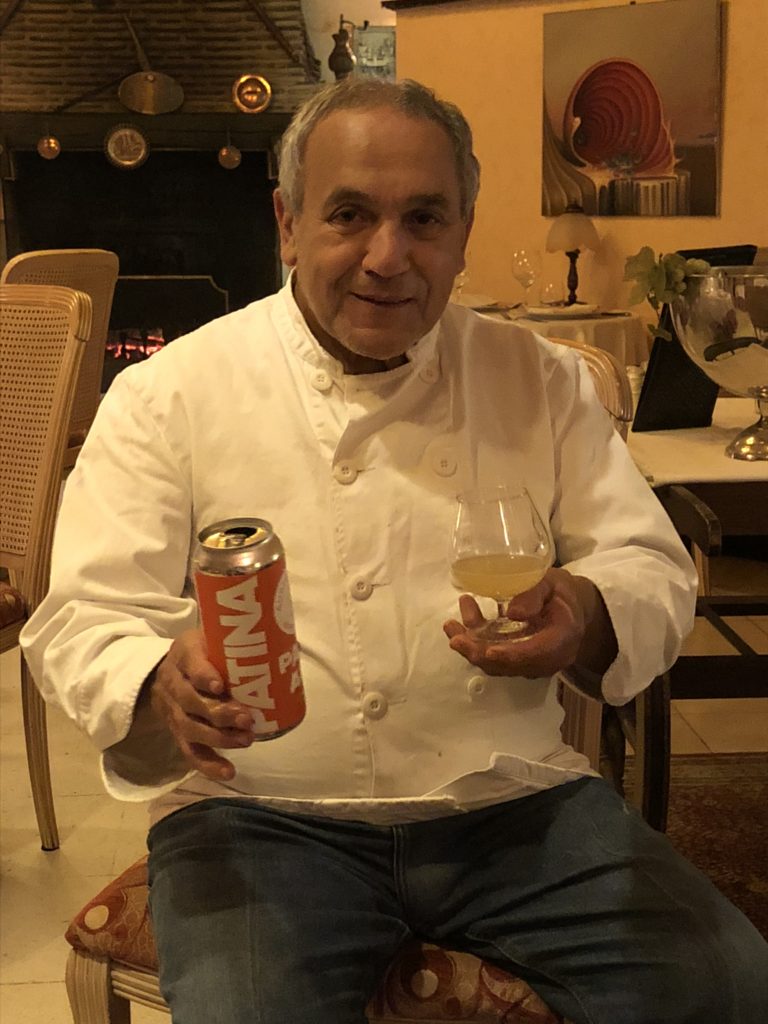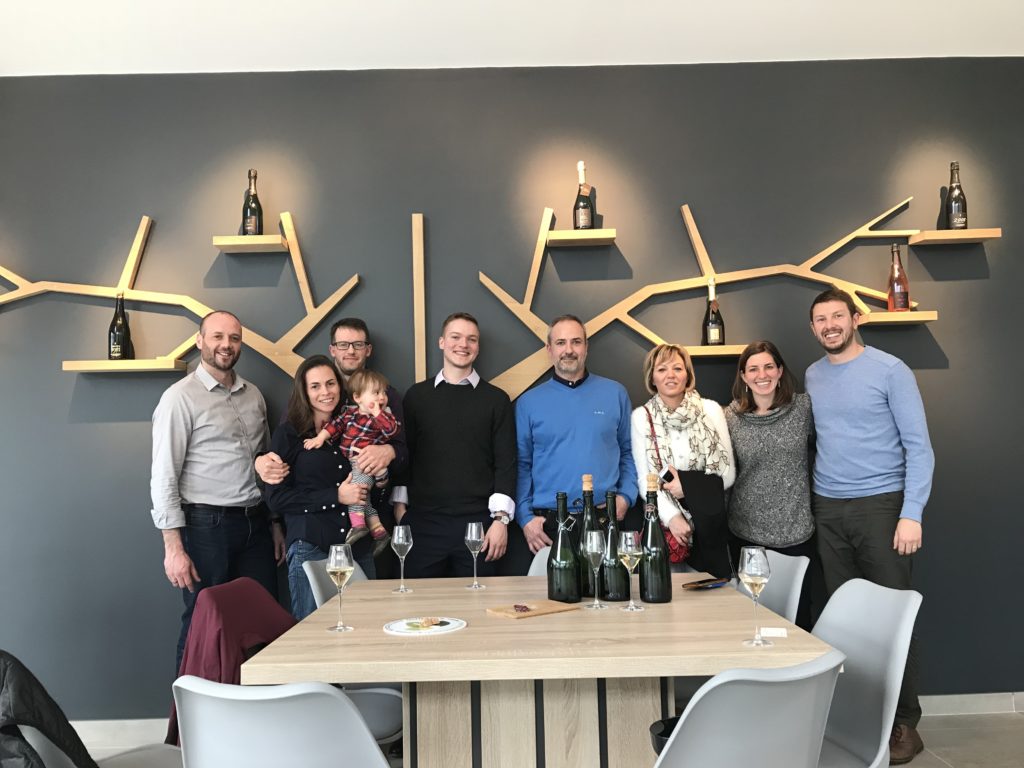14 May Trade Mission Trip Report: France (April 2018)
On April 4, 2018, three lawyers, two wives, and a little baby from Opticliff Law ventured to France to learn more about tiny trade channels between France and the US. The firm’s focus was on small (“craft”) producers of wine and champagne who would like to explore exporting their product to the US market in some form. Additionally, one of the lawyers – Thomas Brems – has his own champagne importation company representing small growers called Victorieux Champagne, and he was on a concurrent mission to seek out additional varieties of champagne to import, and to create and strengthen relationships with small growers for future growth of his company. Here’s the report from the firm managing partner, Zeke Callanan:
During our trip we collectively met with ten French champagne producers, most being Récoltant Manipulants (grower producers that exclusively grow their own grapes to make their wines). They ranged in size from 450 bottles a year of production, to over 100,000. Their business models varied: some grow all their own grapes and produce wine from only their grapes (“Récoltant Manipulants”). Others produce more than they grow, so they buy grapes from others. And some grow more than they want to produce, so they sell their unwanted grapes to other producers. One large producer owned a very small patch of vineyards, so they produced wines almost exclusively from grapes produced by other grape farmers around the region (they establish long-term contracts with the vineyards).
We had two incredible guides through the gorgeous countryside of France in Karine Leroy and Greg Journe. With Karine’s degree in champagne and working in a major Burgundy winery and Greg facilitating sales of corks, they know the wine industry inside and out (though there is always more to learn), and were our patient translators. Almost all of the communications flowed through them.
Meeting with Yannick Prevoteau. From left to right: Greg, Katie, Zeke, Quinn, Thomas, Yannick, Karine, Allison, and Andrew
On what was effectively a 6-day trip, this transpired on somewhat of a breakneck pace (the baby could not keep up). So, it left some very tired people at the end of each day, especially after drinking wine all day! Tough lives, we know. Business meetings in France are not like those in the US. The first 2 hours of a meeting is essentially getting to know the people. Is this someone we trust? Would we like to work with them? The last 40 minutes is about understanding their business and if we could help.
What we found, in general, is that for the producers that did not currently export their product, there was great interest in finding a way to expose their product to the US wine markets. With shrinking sales in France, and the US rapidly rising to the highest value market for wine in the world, the market trends lend to exportation to the US. Since all the wine we tried was generally of very high quality and produced with great passion andartistry (much like the craft producers of beer in Maine), the likely market for these products are higher-end wine-focused markets, such as the metropolitan areas of Boston, New York City, Chicago, and Los Angeles. The largest challenges to any establishing small exporter are the three-tier systems in the states and focusing on the right distribution channels, but there is also a marketing hurdle. Like so many craft breweries, they are just a tiny fish in an enormous pond. Our job, as we see it, is help them figure out and navigate the system in such a way as to minimize expense, and maximize exposure for their budgets, so that they can present a fairly affordable product to US consumers.
For those producers that already export to the US in some manner, we brainstormed a number of ways to help them find cheaper exporting options, different markets, and different branding or presentation options that might expose their product to a few more consumers. We hope those conversations continue.
Grower Champagne a Dying Art?
We learned that vinting grower champagne may be a dying art. Many small producers are feeling the pressure of losing out on domestic sales to foreign sparkling wines which are heavily marketed. In addition, large French houses such as Moet and Chandon, Veuve Cliquot, Tattinger, Nicholas Feuillete, Mumm, Perrier Jouet, etc. cleverly adjust their purchase-price of grapes to be at the same value a grower-producer would profit vinting their own unique wines. This lends to small producers, especially those recently taking over their family-line of vineyards, taking the easier and less-risky path of selling all of their annual production (often times in one-sided and decades-long agreements). These large houses commercialize the art, and hide flaws in their products through clever additions of dosage and masterful blending. Due to powerful marketing budgets, these large houses have been able to dominate and force out smaller growers. This is similar to the large beer companies in America and their effect of craft brewers. In the end, the consumer is left with a commercially dominated, less-than-prone to innovation, and just plain flat champagne market lacking of the terroir that provides grower champagne its charm.
Maine Beer in France
We also learned that there may be a market for Maine beer in France. A few facts play into Maine being well positioned for the major France beer market cities of Paris and Lyon. First, our beer is better. OK– at least different. Our New England IPAs (“NEIPA”), offering full palates of hop varieties, playful innovations, and those sweet, sweet unfiltered juicy notes, are few and far between in most of France. With products of quality, this low-supply creates near automatic demand, especially when borrowing from the high-end cachet of American products in France to help with marketing. Second, we have the closest US port, and a high-functioning freight forwarder offering reefer (temp-controlled) containers right here in Portland. A shipping container could unload in Paris within one to two weeks from departure. Third, our breweries are growing and may soon have the production capacity to produce enough for export or have the capital to arrange for production contracts overseas.

Eddy, Chef and Co-Owner of the Auberge de la Scierie in Aix-en-Othe, France
In exploring this potential we decided to six pints of Maine beer into our suitcases to share with chefs, wine producers, and other industry members we came across. The beers selected were two Bissell Brothers The Substance Ales; two Austin St. Patina Pale Ales; and, two from Maine Beer Co.- Woods & Waters and Lunch. We shared a Bissell Brothers Substance with Champagne Gremillet, the largest champagne producer mentioned. We shared an Austin St. Patina with Cédric Guyot, the current producer of Victorieux Champagne’s Brut Tradition, Rosé, and Millésime 2009. We shared a Woods & Waters and Patina with Eddy (pictured), a world-class chef and co-owner of the Auberge de la Scierie. And finally, we shared a lunch with Maxe Fontaine, the smallest champagne grower-producer mentioned. And finally, we shared a Bissell Brothers Substance with Ray, Eddy’s brother-in-law, and a proper Englishman and beer lover.
The results across the board were positive, and unanimously in awe and spectacle of the difference in flavor of our Maine beers. The unfiltered, orange-juice-looking, floral and hoppy beers were unlike any that they have had before. The tamer and truer-to-tradition Maine Beer Co. beers were well received, but were admittedly less bizarre to our test subjects, and so garnered less attention.
In Conclusion
At the end of the day, the trip was productive: we made several in-roads to small producers, deepened our relationship with our amazing guides with an eye toward long-term business relationships, learned about the potential of Maine beer in France, and got to see the beautiful and rolling countryside of France. This was a trip I won’t soon forget, and I’ll be sure to go back again at a more leisurely pace.
Opticliff Law welcomes conversations and inquiries about this trip, France in general, or import/export law. Don’t hesitate to drop us a line or set up a complimentary preliminary phone call.



